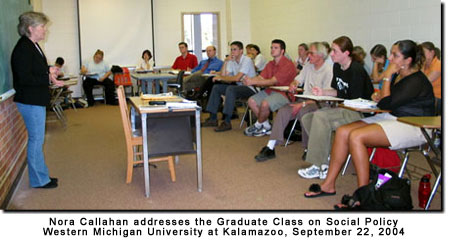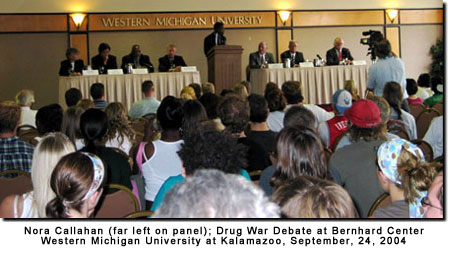 |

|
 |

|
|
September 20, 2004 - Kalamazoo Gazette (MI)Forum Features Several Viewpoints On Drug WarThe War On Drugs Will Be A Topic For Discussion Thursday Night At Western Michigan University's Bernhard CenterSeveral individuals, including justice and law-enforcement officials from throughout the state, will take part in the debate. The event, which will be held from 6 to 8 p.m., is part of the WMU Peace Week celebration and is open to the public. The discussion will feature eight panelists, including Kalamazoo County Prosecutor James Gregart, Kalamazoo County Circuit Court Judge Philip D. Schaefer and Detective Lt. Bill Ford, commander of the Southwest Enforcement Team.
Sheriff Bill Masters, of the San Miguel County, Colo., Sheriff's Department will take part in the event. Masters has served with the department since 1979 and is an advocate for the repeal of drug prohibition, according to a WMU news release. Other participants in the debate will include state Sen. Tom George, the Rev. Edwin C. Sanders II, Nora Callahan and Sanho Tree. Sanders is the founder and senior servant of the Metropolitan Interdenominational Church, which has outreach ministries for drug abusers. Callahan is a founder of the November Coalition, which she founded with her brother, who is currently serving a 27-year sentence in a federal penitentiary. The coalition attempts to raise awareness about the injustices of the drug war. Tree is a fellow at the Institute for Policy Studies in Washington, D.C., and director of the organization's drug-policy project, the news release said.  September 22, 2004 - The Western Herald (MI - Edu)City Discusses Drug WarBy Maria Karadimos, News WriterThe dispute over the funding of Kalamazoo's own fight against recreational drugs has sparked a debate that will feature a panel of local and national professionals. The debate, titled "War on Drugs: Helpful or Harmful?" is part of a week-long campaign. Sponsored by Students for a Sustainable Earth, it is the third major event during Western Michigan University's "Peace Week," which is organized by the Progressive Student Alliance. Ben Lando, senior majoring in political science and member of the PSA, said the issue has been a topic of discussion between the city of Kalamazoo and the county of Kalamazoo. "It's going to be a discussion on the importance of [the drug war] and what kind of direction the war on drugs should go into," Lando said. He added that a few direct effects of the war on drugs could pertain to students. "If you've been convicted of a drug charge, you cannot get financial aid," he said. "It also takes a lot of taxpayers' money to fight the war on drugs -- specifically, $44 billion a year." The debate, scheduled for 6-8 p.m. Thursday in the West Ballroom of the Bernhard Center, will be moderated by WWMT Channel 3 reporter Terrell Forney. Lando said Forney will facilitate the discussion and take questions from the audience. "It'll be a discussion about a very topical issue for students, people of our society and taxpayers," Lando said. "It should be a very interesting discussion." The panel of guests will include Jim Gregart, Kalamazoo County prosecuting attorney; Philip Schaefer, presiding judge of the Men's Drug Treatment Court and former chief judge of the Kalamazoo County Circuit Court; Bill Ford, detective first lieutenant; state Sen. Tom George; Bill Masters, sheriff of San Miguel County, Colo. since 1979; the Rev. Edwin C. Sanders II; and Nora Callahan, founder of the November Coalition and Sanho Tree, a member at the Institute for Policy Studies in Washington D.C. and director of the institute's drug policy project.  September 24, 2004 - Kalamazoo Gazette (MI)Experts: Is Drug War Worth The Fight?Bill Masters says he took the drug war seriously. Masters, the sheriff of the San Miguel County, Colo., since 1979, has done all he could to rid his community of illegal substances. But a number of years ago Masters began to notice a problem. "The drugs just got worse and worse," he said. During his time in law enforcement, Masters has become an advocate for the repeal of drug laws. He was part of a seven-person panel Thursday night at Western Michigan University's Bernhard Center that debated the validity of the country's war on drugs. The event drew about 200 people. Law enforcement should " arrest people for their crimes, not what they put in their bodies," Masters said during the two-hour event, which was part of WMU's Peace Week celebration. Views from both sides were heard Thursday, including members of law enforcement and criminal justice officials from Michigan and Kalamazoo who support the war on drugs. Lt. Bill Ford, commander of the Michigan State Police Southwest Enforcement Team, said the amount of illegal substances now being circulated on America's streets is "out of control" and their availability has increased over the years. "You're wrong if you think legalizing drugs will help that," Ford said. Audience members tended to give more support to the views put forth by panel members who spoke against drug prohibition, including Sanho Tree, a fellow for the Institute for Policy Studies in Washington, D.C. Tree said the country's war on drugs has done nothing to stop the flow of illegal drugs in the country, and instead, has made the substances more profitable. "Prohibition doesn't mean you control drugs. It means you lose the ability to control drugs," said Tree. He said that about a quarter of the 8 million people in the country currently serving prison sentences were convicted of some sort of drug crime. About half of those 2 million drug offenders were first-time, nonviolent criminals, he said. "We have to be effective rather than tough," Tree said. The Rev. Edwin C. Sanders II, the senior minister and founder of the Metropolitan Interdenominational Church in Nashville, Tenn., has outreach programs in areas such as substance abuse. Sanders said racism and racial profiling are prevalent in the justice system and the country's fight against illegal substances. He said blacks make up the majority of those currently serving time in the nation's prisons and those convicted of drug offenses. "Something is wrong with that," Sanders said. "It has everything to do with race." Ford and his counterparts on the panel -- Kalamazoo County Prosecutor James Gregart and Kalamazoo County Circuit Court Judge Philip D. Schaefer -- agreed that there is a disproportionate number of minorities currently circulating in and out of the criminal justice system. However, Gregart and Schaefer said the county's drug court has been a positive initiative that offers rehabilitation for substance abusers rather than time behind bars. "There is a social cost that we pay for using substances," Gregart said. "There is a social price, an economic price, for legalizing substances. The question is, are we willing to pay that price?" he said. While their views differed, the seven panelists agreed that those in the audience could take the initiative to promote the changes they feel are needed for the nation's drug enforcement policy. Masters recommended that citizens speak to lawmakers and "demand that they change the tools we work with." "Don't put that on us," Masters said. "Make legislators make the change." Ford agreed. "I'm going to remember this night for a long time," Ford said. "But I hope 25 years from now your kids aren't in this room complaining about this because you didn't do anything about it." |
||||||||||||||||||
|
|
|